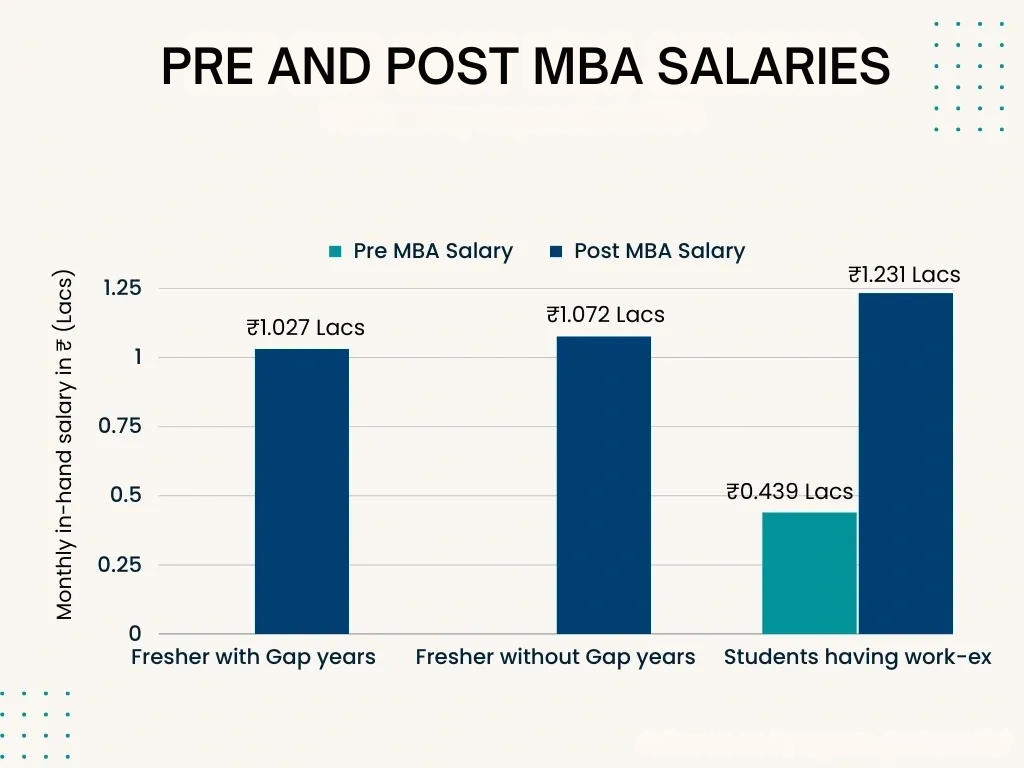
MBA Salaries in India: A Complete Guide 2026
Pursuing an MBA degree requires time and effort but offers numerous benefits. This degree opens the door to numerous MBA jobs in various fields such as tech, finance, human resources, management, or any leadership positions. It also allows you to grow your professional network, build management and leadership skills, and gain credentials to establish your career.
If you are trying to decide whether or not to pursue an MBA and what it will hold for your future or what some of the top MBA salaries are, you have come to the right place. This blog will help you understand how pursuing an MBA can boost your salary and earning potential by helping you upskill your core skills, strengthening your critical thinking skills, and helping you build credibility.
To choose the right program, check out our guide on Online MBA programs in India.
Overview of MBA Salaries in India
Salary statistics in India are equally dynamic and influenced by other factors such as the trends in the industry, the reputation and standing of the institution, and the kinds of skills the graduates possess.
Salary levels for MBA graduates start from competitive levels in India, and the figures become even higher when the graduates are alumni from top tier B schools, which offer them very attractive packages for what they call a very exhaustive campus training program and networking.
Compensation levels for finance, consulting, and technology sectors are higher; new-age domains such as digital marketing and entrepreneurship are also picking up speed. Knowledge about these salaries is significant for all aspiring MBAs as they strategize on their educational and career choices in a rapidly evolving job market.
What are the factors influencing MBA Salaries?
There are several factors affecting the salary of MBA grads that come into play; some of the important ones are
University:
The first one to come into play is the MBA colleges, or business schools. The reputation and ranking of the institution play a vital role in determining salary outcomes. Prestigious management schools such as IIM, XLRI, Amity and Symbiosis are known for their rigorous academic programs, distinguished faculty, and extensive alumni networks. Pursuing an Online MBA From Amity and other top-tier institutions typically commands a higher average salary.
The brand value of these institutions enhances employability and attracts top recruiters, leading to a better salary.
Work Experience:
One of the significant factors influencing salary for an MBA graduate is prior work experience. Candidates who enter MBA programs with previous work experience tend to be more attractive to recruiters than their non-experienced peers, as they bring practical knowledge and skills that can be applied directly to their new roles. During placement, candidates with previous work experience often receive higher salaries than their non-experienced peers. This disparity is due to the fact that experienced candidates can adapt quickly and contribute effectively from day one.
MBA Specialization:
The specialization you choose greatly impacts the prospects of MBA grads’ salaries in INDIA. Different specializations align with varying industry demands and payscales. Some of the high-paying MBA specializations are:
- Marketing and sales
- Consulting
- Finance
- Human Resource Management
- Operations and international business
- IT and Systems
Industry-wise Salary Breakdown for MBA Graduates
Here is the list of the salary breakdown for MBA Graduates of different industries for a better understanding of the program:
Industry | Top Recruiters | Salary Range (INR) | Average Annual Salary (INR) |
|---|---|---|---|
E-commerce | Amazon, Flipkart, Meesho | INR 10 LPA – INR 40 LPA | INR 14–28 LPA |
Investment Banking | Goldman Sachs, JP Morgan, Morgan Stanley | INR 15 LPA – INR 50+ LPA | INR 20–35 LPA |
Education/EdTech | Byju’s, Unacademy, upGrad | INR 5 LPA – INR 15 LPA | INR 6–10 LPA |
Finance (Non-IB Roles) | HDFC, ICICI, Axis, KPMG | INR 7 LPA – INR 25 LPA | INR 10–18 LPA |
Technology/IT | Google, Microsoft, Infosys, TCS, Wipro | INR 8 LPA – INR 30 LPA | INR 10–22 LPA |
Product Management | Amazon, Flipkart, Swiggy, Zomato | INR 15 LPA – INR 45+ LPA | INR 18–35 LPA |
Telecom | Airtel, Jio, Vodafone-Idea | INR 6 LPA – INR 20 LPA | INR 9–16 LPA |
FMCG | HUL, Nestlé, P&G, ITC | INR 9 LPA – INR 30 LPA | INR 12–22 LPA |
Healthcare/Pharma | Cipla, Dr. Reddy’s, Sun Pharma | INR 6 LPA – INR 22 LPA | INR 9–16 LPA |
Manufacturing & Operations | Tata Steel, Reliance, Maruti, Hero | INR 6 LPA – INR 20 LPA | INR 8–15 LPA |
Startups (Early Stage) | Razorpay, CRED, Zepto | INR 6 LPA – INR 30 LPA (equity heavy) | INR 8–15 LPA (plus ESOPs) |
Energy & Utilities | NTPC, ONGC, Reliance Energy | INR 6 LPA – INR 18 LPA | INR 8–14 LPA |
Retail | Future Group, Aditya Birla Fashion | INR 4 LPA – INR 18 LPA | INR 6–12 LPA |
Consulting | McKinsey, BCG, Bain, Deloitte, Accenture | INR 10 LPA – INR 40+ LPA | INR 14–25 LPA |
Public Sector (via MBA) | PSU Banks, Government programs | INR 4 LPA – INR 15 LPA | INR 6–12 LPA |
Note:
- Graduates of IIM A, B, C, ISB, and XLRI typically receive a salary on the higher end of the given ranges.
- Salaries fluctuate with several factors, such as years of experience, MBA specialization, tier of B-school, and location.
- Most of the startups and product/tech companies offer bonuses and ESOPs.
What are the regional salary differences for MBA graduates?
This article mentions how geographical location within India can affect MBA salary differentials. The salary variations have been pooled into three categories, with the use of these illustrations: the metropolitan cities, other tier one cities, and tier two and three cities.
1. Metropolitan Cities:
- Mumbai: As the financial capital of India, Mumbai has some of the highest salaries in MBA and almost all fields, especially in finance, consulting, and banking. Here, starting salaries range from INR 10 lakh to INR 25 lakh annually, depending on the institution and industry. Another major business hub, salaries for MBA graduates in Delhi NCR typically range from INR 8 lakh to INR 18 lakh, with strong opportunities in consulting and e-commerce sectors.
- Delhi NCR (Gurgaon and Noida): Another major business hub, salaries for MBA graduates in this area typically range from INR 8 lakh to INR 18 lakh.
2. Other Tier 1 Cities:
- Hyderabad: As a developing IT city, MBA graduates from Hyderabad generally earn between INR 7-15 lakh per annum, with the maximum salaries offered in the technology and operations sectors.
- Chennai: An MBA pass-out generally gets around INR 6 lakh to INR 14 lakh per annum in Chennai, with openings for manufacturing and IT sectors.
3. Tier 2 Cities:
- Pune: Education and IT hub wherein an MBA could expect something in the range of INR 6 lakh to INR 12 lakh per annum.
- Ahmedabad: Traditionally today around 5 to 10 lakh salary range as Ahmedabad is considered a business hub especially in textile and pharmaceutical sectors.
4. Emerging and Tier 3 Cities:
Small cities have a poor average salary basis, which ranges from Rs 3 lakh to Rs 8 lakh per year. Such areas are not very popular, however, but cost much less than what is referred to at these locations in terms of living.
- Industry Influence: The sector could also and very possibly account for large variations in salary
- Consulting and Finance: The salary packages tend to be the highest offered in all regions of the country. IT and Tech are comparatively lower but still offer quite a bit in major sites than most.
- Manufacturing and Operations: Companies compensate their workers very poorly.
It can be said that there are very few lucrative options in India for an MBA graduate, as these are highly regionalized and dependent on industry types and individual skills or specializations.
What are the entry-level vs. experienced MBA salaries?

One of the major factor affecting the salary of MBA graduates is prior work experience, candidates with prior work experience tend to draw more recruiters toward themselves than the freshers with no past working experience. This is due to the fact that candidate with work experience will adapt fast and apply their knowledge and skill more effectively and effieciently in the work from day one.
Entry-Level MBA Salary
- Typical Range: Entry-level salary for an MBA graduate varies between INR 6 lakhs and INR 12 lakhs per annum, according to the dignity of the B-school and the sector under consideration.
- Top Institutions: Graduates of premier institutions like the Indian Institutes of Management (IIMs) or any other top-tier business schools can demand much better salaries at a range of INR 10 lakhs to INR 20 lakhs per annum.
- Industries: Entry-level jobs are mostly offered in consulting, finance, marketing, and technology, and consulting firms tend to provide the highest pay packages to those entering jobs for the first time.
Experienced MBA Salary
- Typical Range: Professionals enjoying several years of experience (around 5-10 years) can expect a pay range from INR 12 lakhs to over INR 25 lakhs per annum.
- Sr. Positions: Employees with stock higher in specialized areas or senior management positions in finance, consulting, and technology, or leadership roles in high-end sectors may receive salary packages simply above INR 30 lakhs to INR 50 lakhs per annum plus.
- Experience Matters: Experience, skill set, and performance are vital in determining increments in the salary of the MBA workforce.
The overall growth of salary-field opportunities from MBA increases, especially with continuous improvements in skill and exposure, over time. Depending on the geography, specialization area, and personal negotiation skills of the candidate, salary varies greatly.
The Impact of Specializations on Salaries
The specialization influences salary quite substantially and is different in every field and industry. Specialized education or training helps individuals earn higher salaries than their generally qualified fellows.
- Higher Demand for Specialized Skills: Industries such as technology, healthcare, finance highly need specialized skilled professionals. There lies the lucrative salary as the employers pay a specialized premium for such areas as data science, cyber security, and specialized medicine.
- Job Security: A more jarring job security is another add-on to specialization. An employee with some niche skills is less likely to be fired. What happens is the employee serves the company with direct contributions to success. Thus, long-term income prospects are likely to be better.
- Providing Leverage: Specialized skills make the negotiation of salary by individuals higher. It is because of the investments an individual made in accruing knowledge in the specialized field that would result to higher initial wage and bigger raises.
- Promotions: A specialty could affect rising positions. Specialization could lead to a managerial position in the profession. The project manager position is usually an area where project engineers find it easier to go towards as it carries an extra weight in pay.
- Continuous Learning and Certifications: Continuous improvement of professionals to keep them abreast concerning their specifications or modernity in the industry earns them more bucks. Certifications acquired in a particular field serve to legitimize expertise and increase marketability.
However, specialization may require an individual to invest much time in learning and developing a skill; but the chances of earning higher salaries and advancing in careers make it a very fruitful investment for many people who look at the current job market.
Conclusion
Hence, an MBA in India, as it is popularly believed, should provide much to you in terms of productive careers and take home competitive salaries. Several factors affect income potential, ranging from good institutes to industry demand and geographic location. All these greatly determine the salary expectations.
As we now know, MBA graduates are exposed to many industries that pay lucrative salaries, and these lucrative specializations continue to boost the marketability and the paycheck of the newcomer.
Whether you first start with your MBA or want to take it to the next level, it is important to understand the dynamics. With wise decisions and by making the most of your special opportunities with your MBA, you can build a bright and successful career in India’s ever-changing business landscape.
FAQs:
1. What factors influence the salary of MBA Graduates?
A: MBA salary is influenced mainly by the reputation of the business school, the industry of employment, geographic location; work experience, specialization, and the economic conditions. For example, top-tier institutions usually yield higher salaries for the graduates.
2. What is the general entry-level salary of an MBA graduate?
A: Entry-level salaries for MBA graduates commonly fall in the range of INR 6 lakhs to INR 12 lakhs per annum. Graduates from premier institutions like IIMs can expect their salaries to be somewhere between INR 10 lakhs to INR 20 lakhs.
3. How does geography affect MBA salary?
A: A geographic location significantly determines salaries. For example, an MBA graduate will find that he/she earns more in starting salaries in a metropolitan city such as Mumbai and Delhi NCR, graduating with a yet small figure of INR 10 lakhs to INR 18 lakhs, while doing so in tier 2 or tier 3 cities, where salaries may start from INR 3 lakhs.
4. Does Specialization Lead the MBA Graduate to Prosper?
A: Yes, it does, specialization considerably impacts the salary potential of the graduate. Graduates who specialize in high-demand areas like data science, digital marketing, or healthcare management receive higher offers than those having general qualifications, as today’s job market offers a high demand for specialized skills.

